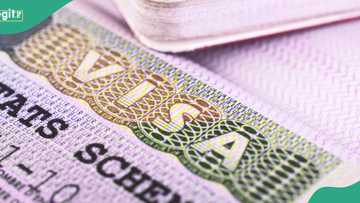US Introduces Visa Integrity Fee on Nigerians, Others After Trump Threatens Tariff
- Starting in fiscal year 2025, a new $250 Visa Integrity Fee will be imposed on most non-immigrant visa categories, making the application process more expensive for applicants wishing to travel, study, or work in the US
- This fee aims to encourage compliance with visa regulations, with refunds available for those who fully adhere to the conditions, though no exemptions or reductions will be granted
- The fee is expected to rise annually starting in 2026, with concerns raised among travellers, international students, and businesses that rely on foreign talent
Legit.ng journalist Zainab Iwayemi has 5-year-experience covering the Economy, Technology, and Capital Market.
Starting in fiscal year 2025, the majority of non-immigrant visa categories will be subject to a new $250 Visa Integrity Fee imposed by the U.S.

Source: Getty Images
The new fee will be added to the current visa application expenses, making it much more expensive for many applicants who want to travel, study, or work in the U.S.
TravelBiz reports that the cost will cover a wide range of visa types, such as J for exchange travellers, F and M for students, H-1B for skilled professionals, and B-1/B-2 for business and tourism.
The additional fee will only apply to holders of diplomatic and international organisation visas under categories A and G.
The fee will increase the cost of a B-1/B-2 visa from its current $185 (about N292,000) to nearly $435 (approximately N686,000).
The Visa Integrity Fee, according to the government, is intended as a compliance tool to promote legal conduct and deter visa overstays. Its purpose is to encourage visa holders to properly follow the conditions of their stay.
Applicants who completely adhere to visa requirements, such as leaving the country within five days after the end of their permitted stay, may be eligible for refunds. Refunds, however, are not given out automatically and require official documentation of compliance. Generally speaking, no exemptions, reductions, or waivers will be given.
Beginning in 2026, the price is anticipated to increase yearly, with the Department of Homeland Security supervising modifications linked to inflation.
The strategy has raised worries among regular travellers, international students, and firms who rely on foreign talent, especially in nations where there is a significant demand for US visas, even though it is presented as a mechanism to improve immigration compliance.
Prospective tourists are being advised to account for the higher expenses as implementation draws near while organising their study, travel, or employment plans in the U.S.
The policy, which emphasises greater accountability for non-immigrant visa holders, represents a larger change in US immigration and visa enforcement.
The Visa Integrity Fee is categorised as a recurrent levy under the law. Evidence of complete compliance, such as a timely departure or a legal change in immigration status, is required to be eligible for a refund.
If an application does not meet the requirements, the fee will be kept and transferred to the general fund of the U.S. Treasury. Refunds can only be granted after the visa expires.

Source: Getty Images
Trump threatens 10% tariff on Nigeria
Legit.ng reported that following US President Donald Trump's warning that he would levy an additional 10% tariff on Nigeria for joining BRICS, there have been conflicting responses.
According to Daily Trust, President Trump declared that Nigeria would be one of several nations subject to an extra 10% tariff for supporting what he called the "anti-American policies of BRICS."
Global trade relations are now even more unpredictable after the U.S. president made the announcement on Sunday in a post on Truth Social.
Source: Legit.ng





